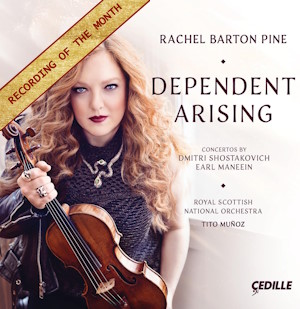
Dependent Arising
Dmitri Shostakovich (1906-1975)
Violin Concerto No 1 in A minor, Op 77 (1948)
Earl Maneein (b.1976)
Dependent Arising – Concerto for Violin and Orchestra (2017)
Rachel Barton Pine (violin)
Royal Scottish National Orchestra / Tito Muñoz
rec. 2022, Scotland’s Studio, Glasgow, UK
Cedille CDR90000223 [68]
Heavy metal music has often been regarded as the joke of rock music – crude, simplistic music for hormonal delinquents. Yet it has always been one of the most technically complex and virtuosic forms of popular music. As the composer Earl Maneein points out in his eloquent and inspiring programme note, that metal arose amongst disaffected urban youth doesn’t make it any less a form of folk music. These two elements – a music of the people and a music that continues the nineteenth century tradition of the virtuoso as showman – form the points of contact between the world of classical and that of heavy metal that forms the inspiration behind Maneein’s blistering concerto, Dependent Arising.
If the mention of heavy metal music hasn’t sent you running for the hills, there are other points of contact. Metal has always had a taste for the Wagnerian, both musically and theatrically, and this means that Maneein’s work, not least in the frankly possessed hands of Rachel Barton Pine, is a veritable Valkyrie ride of thrills and spills. No one is ever going to accuse it of being a subtle piece but it is magnetically communicative.
I want to dispel any worries that this concerto is any way a pastiche like those egregious albums that peddle the hits of Queen arranged for symphony orchestra. This is a serious art work. Indeed, I imagine the average classical listener listening blind would be largely unaware of the influence of heavy metal music on the score. The average metal listener might be equally oblivious though I suspect both will enjoy it a lot!
The influence of Shostakovich seems to me rather more obvious. I wasn’t previously aware of the enthusiasm for the music of DSCH amongst metalheads but I will take the word of composer and violinist. I learn something every day. Again I need to insist that I mean influence and not some kind of reheated Shostakovich leftovers.
Surprisingly for such a trenchant score inspired by such an aggressive musical genre, Dependent Arising has a Buddhist subtext, elegantly outlined by the composer in his notes. The link between Buddhism and metal (and Shostakovich) seems to be alienation in a world of meaningless striving after things that aren’t important like power and money and fame. The first movement seems to deal with the resultant sufferings of the ego whilst the slow movement – which musically offers some rare moments of reprieve- is a meditation on death and the transitory nature of reality. The finale the composer likens to the demons in the Buddhist tradition who frighten people out of their fixation with the affairs of the world. Certainly the frenzy of Barton Pine’s playing in its closing pages would frighten me on to the right path! It is an absolute tour de force of violin playing.
The performance of the Shostakovich first violin concerto which precedes the new piece in the running order I couldn’t help hearing as a kind of heavy metal take on this much recorded work. Both Barton Pine and Tito Muñoz play it for all its worth and there are moments when ensemble is a little bit more untidy than we are used to. Likewise, as Maneein mentions in his notes – he comments in an engaging, passionate way about both works – Barton Pine’s manner could hardly be more different from imperious David Oistrakh. She puts her tone under considerable strain and some pretty strained sounds result. But this is meant to be Shostakovich with the neuroticism turned up to eleven and whilst not the subtlest outing this concerto is ever going to have it is thrilling stuff. Oistrakh excepted, what I hear is Shostakovich much closer to the Russian tradition than the more stately view we usually get from Western performers.
I very much hope the starry name of the soloist draws listeners to this electric coupling. The Maneein ought to hold no fears for anyone who loves Shostakovich and the Shostakovich itself is absolutely terrific.
David McDade
Previous review: Nick Barnard (October 2023)
Help us financially by purchasing from





















